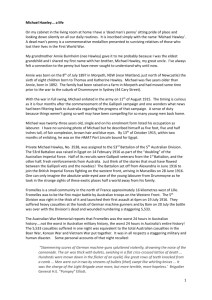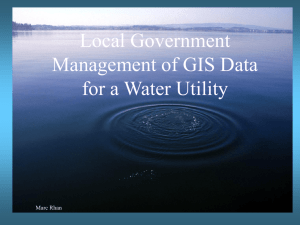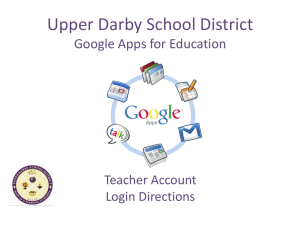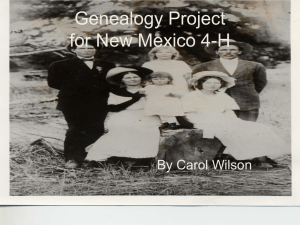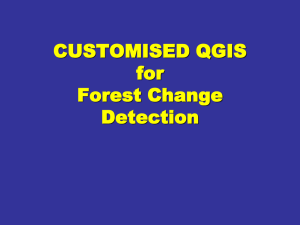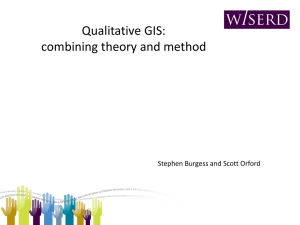Hawley.ppt - Online Geospatial Education Program Office
advertisement
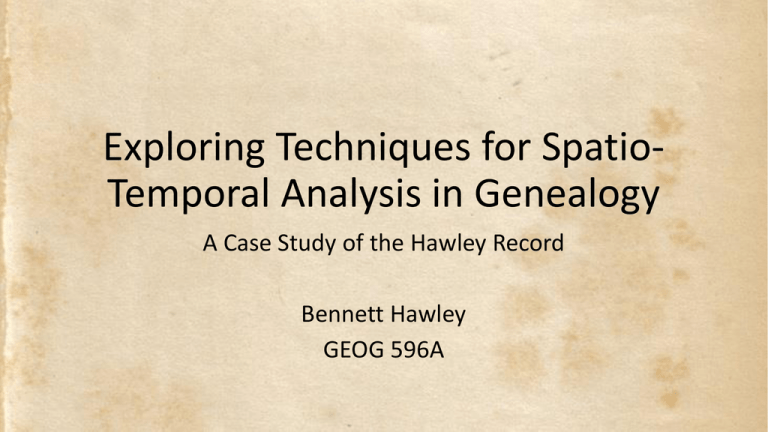
Exploring Techniques for SpatioTemporal Analysis in Genealogy A Case Study of the Hawley Record Bennett Hawley GEOG 596A Introduction • Purpose of this project • Examine Spatio-Temporal analysis in genealogy • This Presentation • • • • Brief overview of genealogy Sources of data Representation techniques Highlight example questions http://www.history-map.com/picture/004/pictures/Richmond-Danville-Railroad.jpg What is Genealogy? “An account of the descent of a person, family, or group from an ancestor or from older forms” -http://www.merriam-webster.com/dictionary/genealogy • Source Examples: • Interviews (first-hand sources) • Historical Records • Census • Obituaries • Birth records http://www.norwoodnylibrary.org/genealogy Sources of Base Data • The Hawley Society • Genealogy research into the Hawley Surname • Online searchable database http://www.hawleysociety.org/ Sources of Base Data • Personal documentation • Obituaries • Family documents Family document created by Charles D. Hawley Sources of Base Data • Ancestry.com • Census data • Birth/Death records • Event records Immediate Hawley Family Tree Immediate Hawley Family Tree Immediate Hawley Family Tree Legend Marriage Birth Knowles, A.K. 1995. Immigrant trajectories through the rural-industrial transition in Wales and the United States, 1795-1850. Annals, Association of American Geographers, 85, 2:246-266. http://www2.geog.okstate.edu/users/HongboYu/NSF-ProjectWebsite/publications/Yu_Shaw_2005.pdf McGlinn, L. 1995. Power networks and early Chinese immigrants in Pennsylvania. Journal of Historical Geography, 21, 4:430-445. Why Explore the Spatial Element? • Demonstrate spatial element usefulness by answering specific questions • What do the lifepaths of the Hawleys look like through time? • How does the average birth distance from person to person change over time? • How do the life paths of the Hawleys change with the introduction of • Roads/Cars? • Rail? Lifepaths of the Hawleys Through Time • Observe the lifepath of the paternal straight-line descendants • Link together each known location using lines • Link in the order of time • Calculate the total straight-line distance for each person Average Birth Distance Change Over Time • Observe the birth to birth distance of the family over time • Link together each known Birth location to the next descendant's birth location • Observe the change over time Lifepaths During Introduction of Transportation Methods • Observe the lifepath of the Hawleys after the introduction of certain modes of transportation • Connect all known residencies for each Hawley member • Observe the distances between each movement when modes of transport are introduced http://www.learnnc.org/lp/media/collections/nc/maps/1854/nc-railroads-1854.jpg Platforms to Analyze Hawley Spatial Data • Several methods to explore • ArcMap • http://www.esri.com/ • Open source GIS packages • http://www.qgis.org/en/site/ • Google fusion tables • http://www.google.com/drive/apps.ht ml#fusiontables • Possible others? Arcmap • Benefits • Familiar platform to many GIS analysts and students • Wide acceptability in field • Diverse functionality • Large body of knowledge and help online Arcmap • Challenges • Expensive license cost • Learning curve • Proprietary formats Open Source GIS Packages • Benefits • Most are freely available • Large variety of packages • Constant development to improve http://qgis.org/en/site/about/screenshots.html Open Source GIS Packages • Challenges • No “ownership” of program base • Not as much support as a large commercial platform • Variable development to address concerns http://qgis.org/en/site/about/screenshots.html Google Fusion Tables • Benefits • Online platform, no software • Built to share results • Very easy to import data and start analyzing https://www.google.com/fusiontables Google Fusion Tables • Challenges • Importing data into Google-owned server base • Limited flexibility with functions without programming https://www.google.com/fusiontables Review/Conclusion • Spatial element an important descriptive resource • Helps describe more information than traditionally available with family trees • Able to answer more locationbased questions with data • Several methods to perform analysis http://www.klahorst.com/Genealogy/ http://downloads2.esri.com/ESRIp ress/images/197/TAGIS_Lrg.jpg • The Hawley Society • http://www.hawleysociety.org/ Bibliography • Ancestery.com • http://www.ancestry.com/ • Life-path line diagrams • Knowles, A.K. 1995. Immigrant trajectories through the rural-industrial transition in Wales and the United States, 1795-1850. Annals, Association of American Geographers, 85, 2:246-266. • Time-space prisms • http://www2.geog.okstate.edu/users/HongboYu/NSF-Project-Website/publications/Yu_Shaw_2005.pdf • McGlinn, L. 1995. Power networks and early Chinese immigrants in Pennsylvania. Journal of Historical Geography, 21, 4:430-445. • http://meipokwan.org/ • Historic transportation maps • http://www.learnnc.org/lp/media/collections/nc/maps/1854/nc-railroads-1854.jpg • http://www.history-map.com/picture/004/pictures/Richmond-Danville-Railroad.jpg • Environmental Science Research Institute (ESRI) • http://www.esri.com/ • QGIS open source GIS package • http://www.qgis.org/en/site/ • Google fusion tables • http://www.google.com/drive/apps.html#fusiontables


